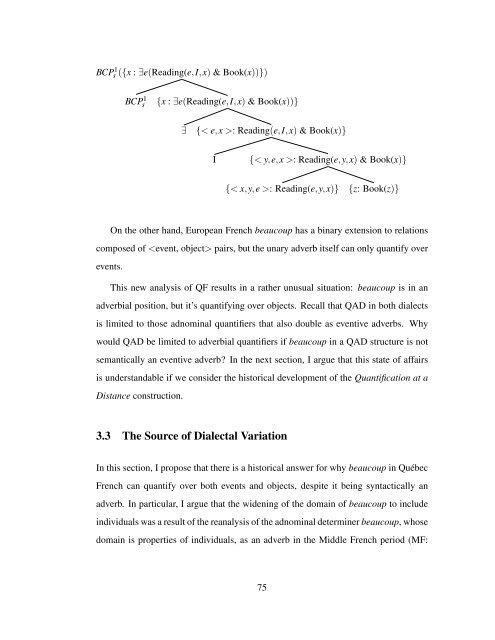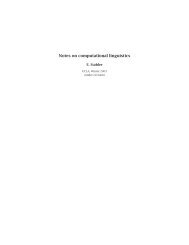Formal Approaches to Semantic Microvariation: Adverbial ...
Formal Approaches to Semantic Microvariation: Adverbial ...
Formal Approaches to Semantic Microvariation: Adverbial ...
Create successful ePaper yourself
Turn your PDF publications into a flip-book with our unique Google optimized e-Paper software.
BCP 1 s ({x : ∃e(Reading(e,I,x) & Book(x))})<br />
BCP 1 s<br />
{x : ∃e(Reading(e,I,x) & Book(x))}<br />
∃<br />
{< e,x >: Reading(e,I,x) & Book(x)}<br />
I<br />
{< y,e,x >: Reading(e,y,x) & Book(x)}<br />
{< x,y,e >: Reading(e,y,x)}<br />
{z: Book(z)}<br />
On the other hand, European French beaucoup has a binary extension <strong>to</strong> relations<br />
composed of pairs, but the unary adverb itself can only quantify over<br />
events.<br />
This new analysis of QF results in a rather unusual situation: beaucoup is in an<br />
adverbial position, but it’s quantifying over objects. Recall that QAD in both dialects<br />
is limited <strong>to</strong> those adnominal quantifiers that also double as eventive adverbs. Why<br />
would QAD be limited <strong>to</strong> adverbial quantifiers if beaucoup in a QAD structure is not<br />
semantically an eventive adverb? In the next section, I argue that this state of affairs<br />
is understandable if we consider the his<strong>to</strong>rical development of the Quantification at a<br />
Distance construction.<br />
3.3 The Source of Dialectal Variation<br />
In this section, I propose that there is a his<strong>to</strong>rical answer for why beaucoup in Québec<br />
French can quantify over both events and objects, despite it being syntactically an<br />
adverb. In particular, I argue that the widening of the domain of beaucoup <strong>to</strong> include<br />
individuals was a result of the reanalysis of the adnominal determiner beaucoup, whose<br />
domain is properties of individuals, as an adverb in the Middle French period (MF:<br />
75
















